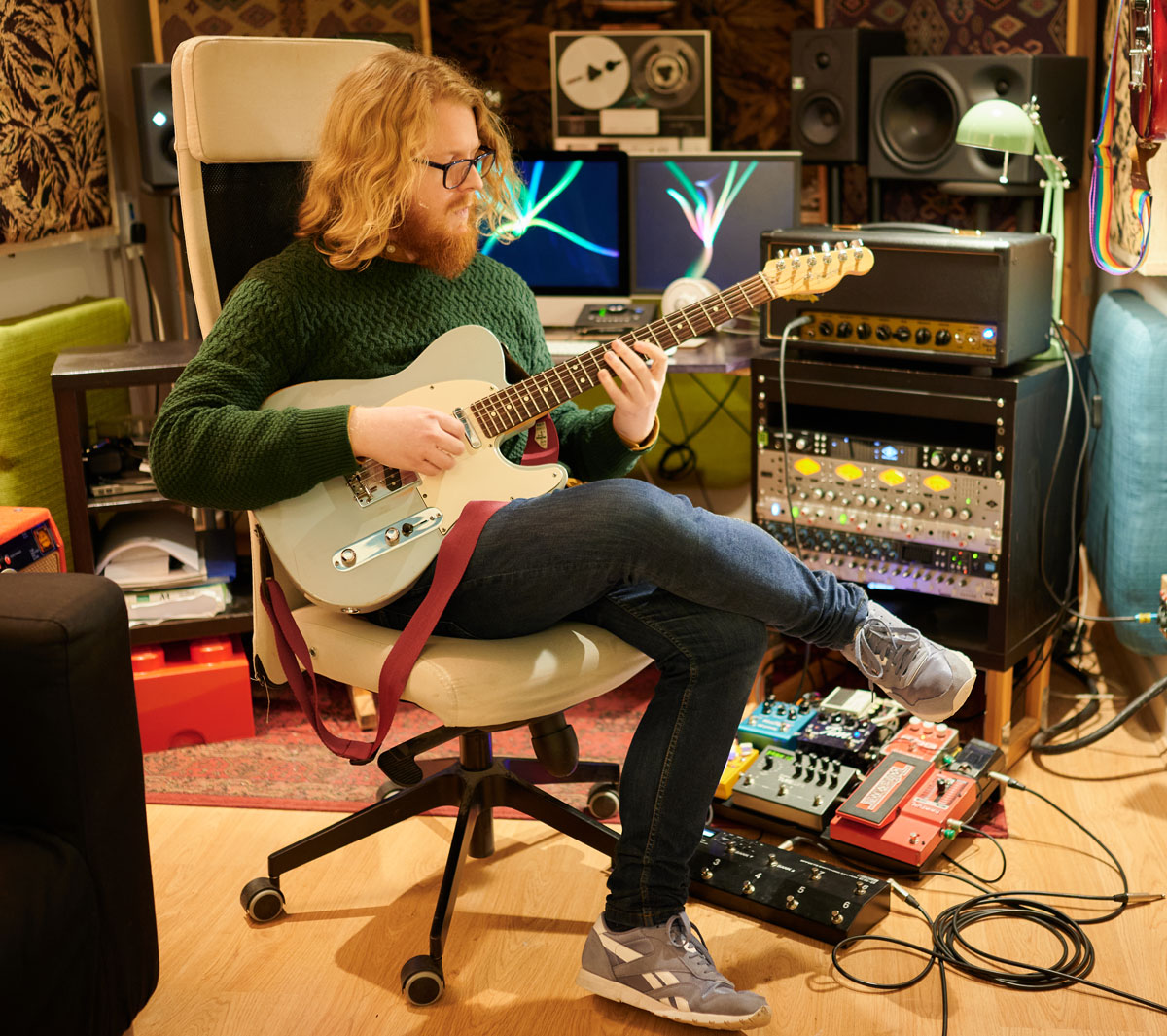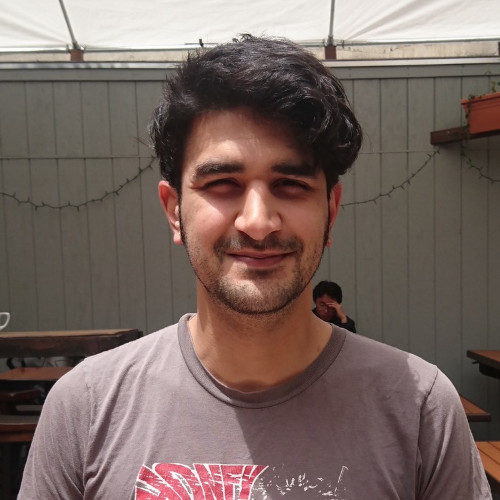Alpha Male Tea Party's Tom Peters: "Throwing a simple major-key riff together wasn't doing it for me any more… I thought, 'How can I use melody differently?'"
The instrumental riff-meister and keen-eared producer details the personal struggle behind making monumental new album, Infinity Stare, and his secret formula for killer guitar tone

While hardly a household name, in a certain corner of the world, Alpha Male Tea Party reign supreme. Their effervescent math-prog riffs set them apart from their contemporaries, balancing a melodic sensibility with a gleeful technical edge.
At the same time, their self-deprecating worldview, expressed in song titles like Your Happiness Was Stored On A Hard Drive And Is Now Corrupt, and I Haven't Had A Lunch Break Since Windows Vista Came Out saw them connecting with a avid group of music fans navigating adulthood in the weird aftermath of the 2008 financial crash.
If 2014's Droids was the album that put them on the map, 2017's Health was the record that defined them. The huge riffage of Nobody Had The Heart To Tell Him He Was On Fire and thundering catharsis of I Still Live At Home were however to some degree at odds with what was going on behind the scenes.
Produced by guitarist Tom Peters and Dan Wild-Beesley, the record "kicked my ass," as Tom recalls, intertwined as it was with a period of ill health for Dan, the guitarist in cult math-rockers Cleft.
Their new album Infinity Stare comes after Dan's passing, and is a record defined by grief. It sees the band for the first time firmly breaking with their tradition of downbeat themes juxtaposed with heavy, major-key riffing. Whatever comes next, it's clear that this is a new era for the band, with Infinity Stare the dividing line in their discography.
We got on the phone to guitarist Tom to discuss the new album, the band's career, and his work as an engineer and producer at his studio in Liverpool, Trapdoor.
What do you see as the differences between Health and Infinity Stare?
Get The Pick Newsletter
All the latest guitar news, interviews, lessons, reviews, deals and more, direct to your inbox!
“For me, it's a much more emotionally affected record. I feel a lot more connected to the songs. I feel like I bad-mouth Health sometimes as I don't think I was in quite the right headspace when we made that album.
“Greg [Chapman, drums] and Ben [Griffiths, bass] really love it but I'm not as fond of it as I want to be, I think... [Infinity Stare has] come out a bit darker, because the last couple of years have been really strange, and really intense, and there's a fairly pronounced narrative around the album about grief.”
About the loss of Dan?
“Losing friends, obviously Dan being the biggest motivation behind the album's existence – but it took ages to get there. It took ages to feel that writing process working. I know it's not as bouncy and as euphoric. Well, I feel like it is more euphoric, but in a different kind of way.
To me the melancholic elements to our music have always been there. They've just not been the centerpiece of the music
“I think there's a melancholy to the euphoria as opposed to the straight-up [raises voice] ‘fucking yeah, come on!’ of our other releases.”
It is a sad record. It's quite noticeable compared to your other albums.
“It's funny, because to me the melancholic elements to our music have always been there. They've just not been the centerpiece of the music, they've just been qualifying elements of what is generally a positive thing.
“I always feel like there can be a lot of melancholy in something that sounds positive, like I Don't Even Like Hollyoaks Anyway, off our first EP. It's a big post-rocky sounding thing, it's essentially in a major key, but it still sounds really sad.”
A thing that's also noticeable is a bit of a break from the approach of 'the riff is the melody and the melody is the riff.' There are a lot more layers with melodic focus there.
“I think it's really fair to say that my time recording [prog experimentalists] Body Hound personally has affected the way that I think about writing music quite a lot. They definitely instilled some different ideas in the way that I approach writing.”
In what way?
“They're just so musical. They understand every aspect of the music, and it made me realize that throwing a simple major-key riff together just wasn't doing it for me any more. That realization – that you can make lots of great melody with lots of groove out of complex harmonies – that's really interesting.
“I'm not going to pretend that our album is at [their] level, but it definitely had an influence on the way I thought about, 'How can I use melody differently from how I've done before?', 'How can I use different tonalities and different focus?' There was just this collective sense when we were jamming that if we did something where we were like 'we've done that before' or 'we feel like we've done that before,' none of us are really getting what we want out of it, then we would move away from it.”
There's also a lot more bass focus on this record.
“I think one of the reasons why Ben has come to the fore a bit in terms of his melodic input is the way in which we ended up writing the songs. There's a few of them that we'd written before COVID, but a lot of them were finished during lockdown, which meant we had this ability to zoom out on what we were hearing, other than what was right in front of us in the practice room.
We did a lot of writing at home ourselves on computers and exchanged ideas and stuff. It doesn't sound very organic, but it made us listen a bit better to what we're actually working on
“We did a lot of writing at home ourselves on computers and exchanged ideas and stuff. It doesn't sound very organic, but it made us listen a bit better to what we're actually working on, and that's why I think Ben did actually let himself go a bit more and write some big melodic moments.”
What's an example of that?
“There's a bit at the end of Desperate For An Atmosphere that Ben plays that wasn't there until we demoed it during lockdown. We'd already written the song, but he just went, 'I've put this bit in at the end – what do you think?'
“It changed the whole dynamic of that section into something so much cooler, it made it sound like a gospel part or something, it was nuts. Ben's so good at writing these little licks that just elevate stuff.”
Which is useful in the context of a power trio, right?
“I think we've always skirted that line anyway. None of our albums are three guys in a room – we've always put lots of layers on and stuff, and banked on being very aggressive in a live context to make up the difference.”
As we've touched on, you're also in demand as a producer and engineer - what's your focus when producing music?
“It's about how naturally I can grab something, the source sound is the thing I'm most interested in, not what I'm going to do with it at the back end. Getting it right on the way in is a bit of a recording cliché, but it is incredibly true. I do think it is important to realize that 'getting it right on the way in' is also subjective as well.”
Besides Body Hound, you've also recently worked on the new Vennart record. Did it influence your approach to the production of Infinity Stare?
“All I did with Mike was help him record his guitar parts... in fact, even though Mike's album came out before ours, [the writing for] our album was finished before he recorded his guitars. We've both been working on records in parallel and we've been hanging out quite a lot. Mike's been sending me mixes and I've been sending bits and pieces and we've just been chatting really.”
How did it come about?
“I just did him a favor. He had a guitar cab, a 4x12 that he was getting rid of and I needed a 4x12 for the studio, so I said 'give me that 4x12 and you can come and record your guitars,' which he did. He was only in the studio for a couple of days. He brought his big stack of vintage Orange [amps] and just smashed it out. I didn't really do anything different – my guitar recording technique has been bolted down for a long time now.”
Did you end up using any of Mike's gear on the new record?
“Yes, I did actually, Mike left a load of his amps in the studio for ages, so I got the run of the fair with those. He's got a '70s OR-120. That was amazing for really filthy low end stuff.
“The low-end that amp puts out is outrageous, so thick but focused. That was fun, and it took the fuzzes like an absolute champ. That, and he's got a 50-watt [Orange Retro 50] custom shop that he had done after he went to see Pavement and he went, 'I need that amp, it sounds amazing.'”
Was there any other different gear?
“Victory also lent me one of their V-40s [The Duchess] for clean stuff. I'd actually asked for the VC-35 [The Copper Vox-style] and the wrong amp turned up and I was like, 'You know what, this is probably beneficial.'
“I'd wanted to try it because I was thinking of retiring [my] Soldano [Astroverb] from live use, just 'cos it's a bit precious. The V40 turned up and I thought from an actual recording perspective that's probably better because I didn't have in the studio at that point a high headroom clean [amp], and that's what the V40 does really well.”
And what's on your pedalboard these days?
I'm a big, big stickler for getting tone right at source
“My pedals haven't really changed a whole lot over the last few years which is something I would like to think I'm proud of, managing to suppress the urge to splurge and all that.
“I use the Boss ES-8 effects switcher at the heart of my board so everything is in loops and I set up patches per song. My main drive – which has been for about five years now – is the Paul Cochrane Tim, which I love so much and plays so nice with my amps. I also have a couple of other drives on there and a fuzz to kick things up when I need to.
“I use lots of different octave and pitch shifting effects too. The Whammy 5 features really heavily on the new record with lots of 5th harmonizing and octave-y stuff, as well as the trusty Micro POG and Boss OC-2 for some '70s squelch.
“On the ambient side of things, I really went to town this time around. I've had a Strymon TimeLine and BlueSky for ages now, but I also added a Collision Devices Blackhole Symmetry to the mix which is an awesome pedal made by some lovely people over in France. It's a multistage weirdo machine with a pitch effectible reverb, super wobbly delay and fuzz all in one so it's amazing for big soundscapey stuff.
“I then run that in stereo into the Victory and Soldano for super-wide delays and 'verbs.”

You mentioned your recording technique was the same for Mike's stuff and Infinity Stare – what was that?
“I'm a big, big stickler for getting tone right at source, so it's always back to 'what's the guitar, what's the pedal, or pedal combination, and what's the amp?' Usually what I'll do on a recording session is I'll use one cab, so I'll have the cab set up in the live room with the mics on it, and just switch heads...
I think a lot of people think of pedal-platform amps as really, really clean, and I don't like that, especially when you're using overdrive pedals
“I've used the same mic pairing [for ages], I've tried to mix it up and do different things but I always go back to this pairing. I use a Shure SM7B and an SE R1 ribbon mic. I bought those from Andertons back in 2014 and I've used them on every session, they sound brilliant. [The SM7B] is a full-range mic, it picks up everything.
“A dynamic mic like an SM57 will have certain rolloffs... whereas to me the SM7B feels really neutral, it picks up the tone of the amp really nicely.”
You mentioned the cab you used was the one you got off Mike, in this case?
“It's a Blackstar Artist with Celestion V30s, it's got the same dimensions as an Orange but it's slanted... in the studio I do like the sound of a 4x12 because the tone blooms a bit more, and you get a little bit more headroom out of the amps.”
Which of your heads got used?
“Amp-wise, I've got a few bits and pieces in the studio that I use all the time, it's more-or-less my Alpha Male Tea Party rig, to be honest. I've got my Victory Sheriff 44 and my Soldano [Astroverb] combo... it's beautiful and I've never seen another one. I think the Sheriff is more JTM-like – it doesn't go full-bore intense dirt, but for me, it's what I think a 'pedal platform' amp should be.
“I think a lot of people think of pedal-platform amps as really, really clean, and I've got to be honest, I don't like that, especially when you're using overdrive pedals. Personally, I prefer it when the amp and pedal talk to each other and respond to each other, and you can hear the amp almost 'sagging', you can hear the compression that's coming out of the amp...
“I say this, but you can get amazing tones out of super-clean Fenders. I've just done a record with Bicurious where most of the tones were just a Fender Hot Rod, and it sounded fucking ace.”
Gain staging is possibly the easiest way to get more out of a decent tube amp, for sure.
“I love those amps [like the Sheriff 44] cos they're not super-clean, and they do start to break up quite quickly, and you can get high-gain tones out of them while using quite low-gain pedals, which means you've got a really broad range of sounds that you can play around with, which I really enjoy...
“I've had a go on the [Sheriff] 22, and that's the opposite end, it breaks up too quickly. 50 watts is the golden wattage for me, for amps.
It's nearing the 10-year anniversary of your first album - how do you account for the longevity of the band?
We often joke about the fact that we're still going to be in a band, playing blues covers in like 40 years in a local Wigan pub
“I really distinctly remember getting called 'new kids on the block,' and then like a year later, we were 'stalwarts of the scene' – I was like, 'when did that transition occur?' [laughs] Because there's never been the pressure to make a living we've never had to do anything at break-neck speed, so it almost makes sense that we've been going as long as we have.
“We often joke about the fact that we're still going to be in a band, playing blues covers in like 40 years in a local Wigan pub. [laughs] We've always said we're going to play the long game... it's just a part of who we are.”
Finally, what do you love about music?
“Sometimes I don't know if I do. It feels like a compulsion sometimes, like a thing that I just need to do. if nothing else I love the way that you can express yourself through music without having to properly explain yourself.”
Infinity Stare is out now via Big Scary Monsters.
Alex Lynham is a gear obsessive who's been collecting and building modern and vintage equipment since he got his first Saturday job. Besides reviewing countless pedals for Total Guitar, he's written guides on how to build your first pedal, how to build a tube amp from a kit, and briefly went viral when he released a glitch delay pedal, the Atom Smasher.
“There’d been three-minute solos, which were just ridiculous – and knackering to play live!” Stoner-doom merchants Sergeant Thunderhoof may have toned down the self-indulgence, but their 10-minute epics still get medieval on your eardrums
“There’s a slight latency in there. You can’t be super-accurate”: Yngwie Malmsteen names the guitar picks that don’t work for shred

![A black-and-white action shot of Sergeant Thunderhoof perform live: [from left] Mark Sayer, Dan Flitcroft, Jim Camp and Josh Gallop](https://cdn.mos.cms.futurecdn.net/am3UhJbsxAE239XRRZ8zC8.jpg)









